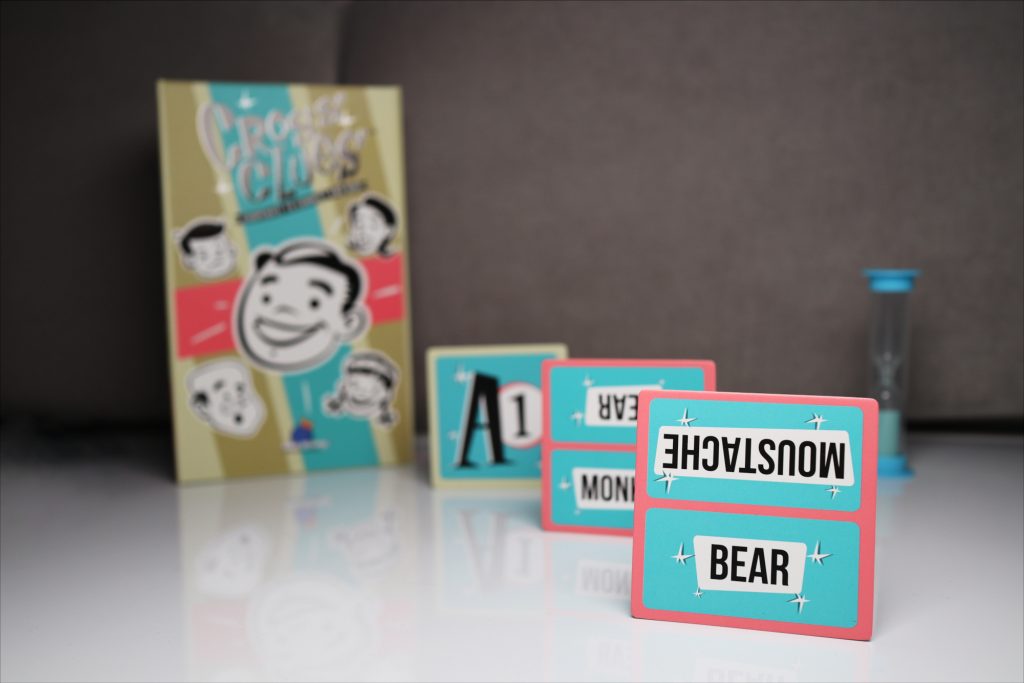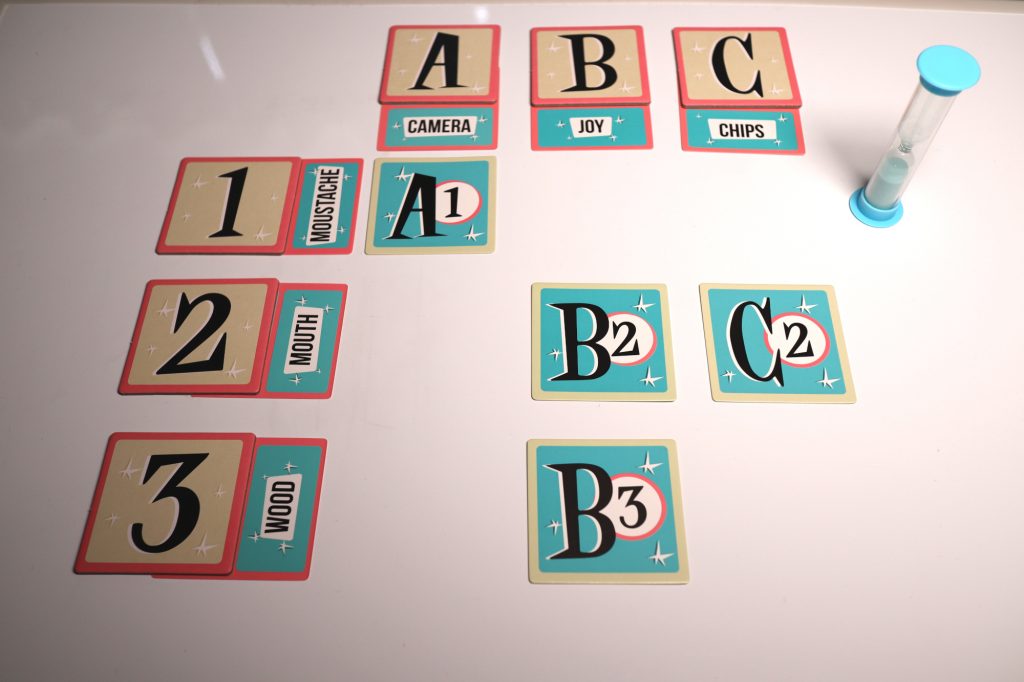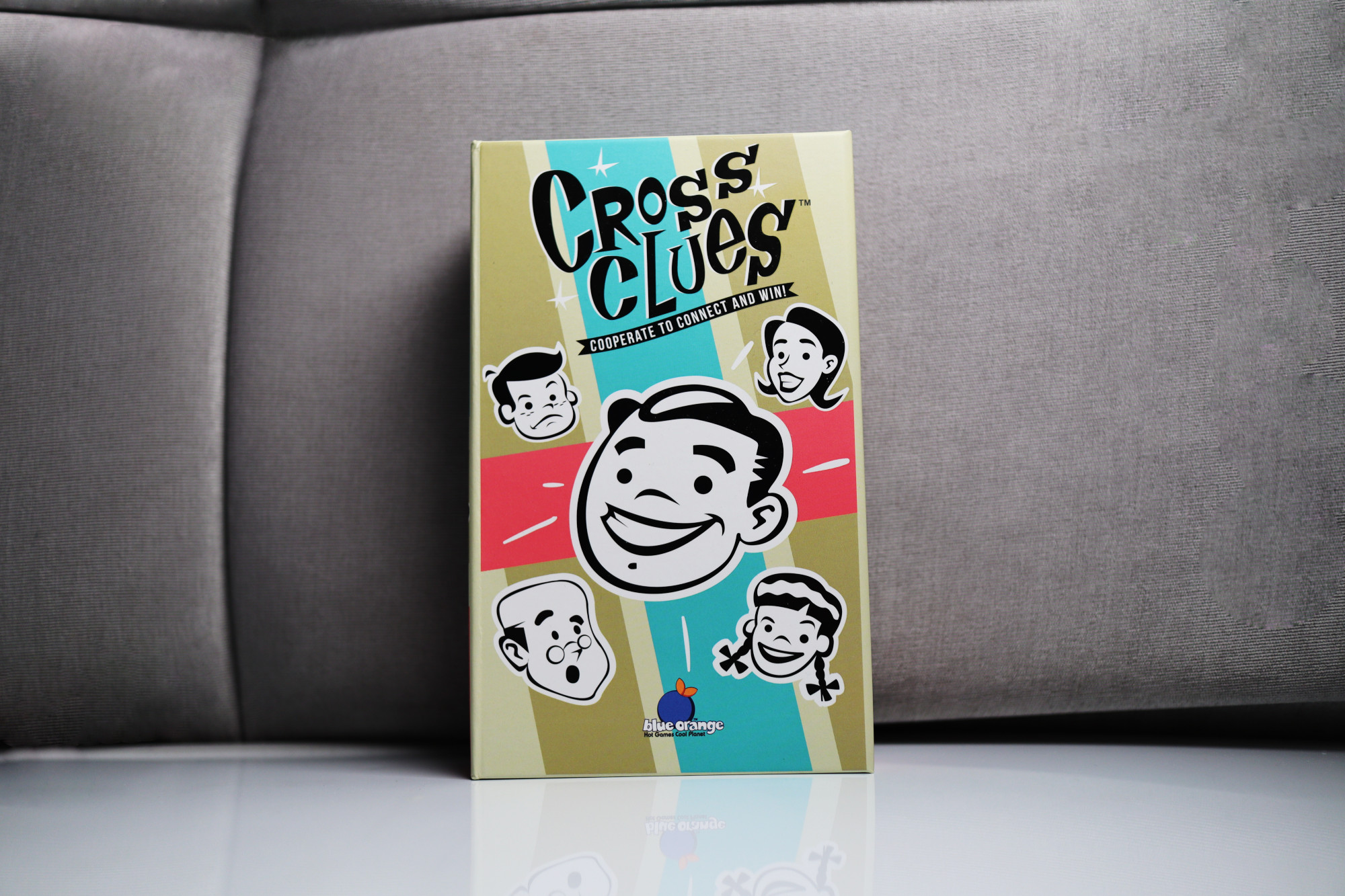Cross Clues is a word based cooperative party game, released just at the end of 2020 by publisher Blue Orange. Designed by Grégory Grard, the game lasts around 5 – 10 minutes and sees 2 – 6 players making various clues for the others to guess – all potentially against the clock. From orange and winter to day and heavy the trick is thinking of a link the others can workout. However, is Cross Clues the link for Fun and Game? Let’s find out!
To play the classic mode of Cross Clues players take the A – D and 1 – 4 axis tiles from the box, and form a grid with the letters on one axis and the numbers on the other. Taking the stack of code word cards from the box, these are shuffled with one placed underneath each of the axis tiles – with only one word showing. The associated clue cards for the grid are then taken and shuffled into a face down deck, with each player drawing one clue card (drawing two in 2 – 3 player games).
Cross Clues is a game without turns though there is structure to the gameplay. All of the players look at their card and this will indicate a position on the grid. This grid position will be something like “B3”. Using this example the player with the “B3” clue card looks at the words associated with the B and the 3 axis tiles. Their objective is to come up with a link for those two words. This link must be a single word and it cannot be a root word. All players are doing this simultaneously, attempting to come up with a link word.
Whoever comes up with what they think is a good link first says it outloud for all to hear. For example, if the words were sun and holiday the player might say “beach”. The other players then can communicate together to decide which grid position is being hinted at. If the team correctly guesses then the clue card is played face up into that position on the grid. If the guess was incorrect then the clue card is discarded face down off to the side of the grid. Therefore, it cannot be correctly guessed for the rest of the game, and means the team has lost the opportunity for that point.

Either way, the player then draws a replacement card and the game continues. Anyone is then able to shout out the link word they have come up with, even if it is the same player again with their new card. The game finishes when the final card has been correctly or incorrectly guessed. There is no elaborate way to score. Instead, players count up the number of filled grid positions (the correctly guessed cards). This can then be compared to either previous scores or to a table on the back of the rulebook.
Players can choose between three difficulty levels and whether to use the optional timer variant in each. There isn’t much of a change in gameplay terms, with the number of grid spaces to correctly guess increasing. Flicking between difficulty levels from one game to the next is relatively simple, seeing more/less clue cards shuffled and a more/less axis tiles placed out is all the change requires. This allows you to teach the game playing a simple express 3 x 3 grid before jumping into a more challenging classic game.
As the name suggests the timer variant introduces the included 5 minute sand timer into the mix. Lasting a little over 5 minutes in actuality, this is used once for the express and classic modes, but it is flipped to give 10 minutes when playing the expert mode. Of course if you want a real challenge you could always try expert mode without flipping the timer over! Going against the clock gives an added pressure, with players not wanting to spend too long coming up with clues, nor debating as thoroughly what clues might hint towards. Inevitably, the clues aren’t as well thought out but perhaps a bad clue is better than one not given due to the time running out.

2 – 6 players is a rather wide player range, and unfortunately not one we have been able to fully test out due to the pandemic. Where many party style games fall down is at the 2 – 3 players end where there isn’t enough for teams. Being cooperative Cross Clues doesn’t have this issue. In fact it works incredibly well at two players, where the players can use their knowledge of their teammate to link words. This makes it a great game for a date night, as long as you do well of course. At the other end of the spectrum, and this extrapolating from the player counts we could play with, you would want to play the expert sized grid. Otherwise each player would only get approximately a couple of clue cards per game each on average.
As with other guessing games that utilize a grid, such as the party game Codenames, Cross Clues isn’t a game that will visually grab players when out on a table. Especially as at the start that grid is empty. The colours from the more eye catching box cover do appear on the cards but the joyful faces don’t make the transition. This gives the grid a rather plain look. While the clue cards are extremely clear which grid space they represent, some artwork would have added much needed flair.
Aside from the plain look, the deck of code word cards is something to be commended. Not only is every card double-sided, both sides feature two words – breathing an incredible amount of variety into the clues. With 50 of these cards included in the box there are 200 words in total. Even playing with the expert grid of 5 x 5 cards only 10 are used at once. With this amount at least the first 20 games played could use completely different words, and this is before the insane number of unique combinations that can occur.
Cross Clues might not be the best visual experience but that doesn’t hamper the game from being a stand out word association based party game. Like the best party games Cross Clues can be played time and time again, with little chance of two games ever being the same. From one game to the next the words used change and if playing with different people even the same words would garner different clues. A nicety is that there’s no need to shy away from in-jokes or references as players are working cooperatively. This all builds together to make an experience that can instantly be enjoyed by all to the fullest. For those that have loved Just One and Codenames over the last few years then Cross Clues is a twist you’ll want to play!
(Editor’s Note: Cross Clues was provided to us by Coiledspring Games for the review. The game is currently available from local board game stores! Find your local store here.)

